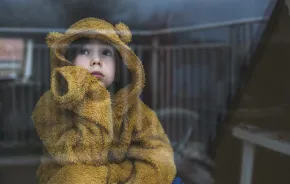 It seems not a day goes by without a horrifying news report of kidnapping, rape or child molestation. And these stories are jarring; after all, aren’t these events every parent’s worst nightmare? We think: If I can just keep my kids away from strangers, they’ll be safe.
It seems not a day goes by without a horrifying news report of kidnapping, rape or child molestation. And these stories are jarring; after all, aren’t these events every parent’s worst nightmare? We think: If I can just keep my kids away from strangers, they’ll be safe.
But here’s the reality: The danger doesn’t always come from people we don’t know. Ninety percent of sexual abuse offenses are committed by someone acquainted with the child, according to data from the U.S. Department of Justice. This can include coaches, youth leaders, music teachers, older teens and neighbors, even members of our own families. “Very, very few assaults are at the hands of a stranger,” says Adam Cornell, a special assistant U.S. attorney in the Snohomish County prosecutor’s office.
Sharon Anderson (her name has been changed), a Seattle mom of two children, ages 6 and 11, knows this all too well. Her brother’s tennis coach abused him for 10 years, starting when her brother was 14. “We all thought [the coach] was a great guy,” she says. “My parents trusted him. He would tell my brother, ‘You’re gifted. You can go so far,’ when in reality he was grooming my brother.”
Tweens: especially vulnerable
According to Darkness to Light, an organization that works to reduce the incidence of child sexual abuse, children are twice as likely to be sexually victimized as adults. Studies report the median age for reported sexual abuse is 9.9 years of age for boys and 9.6 years of age for girls.
Tweens — kids ages 9–12 — are particularly at risk, explains Kim Estes, owner of Savvy Parents Safe Kids, based in Redmond. “They are newbies when it comes to independence,” she says. They are going through puberty, experiencing new feelings regarding sexuality and becoming more focused on their peer groups. At this age, says Estes, kids like to feel grown up — and can be flattered by attention. “They’re not necessarily going to get that uh-oh feeling if an adult or an older teen is suddenly showing an interest in them.”
And that’s how the “grooming” process starts. Parenting expert Pattie Fitzgerald, author of No Trespassing! This Is My Body, explains how predators single out kids. “They are extremely strategic in their tactics,” she says. Offenders tend to go after kids who have a little too much freedom or independence, or whose parents have blinders on. They work on gaining opportunities for privacy and trust. They use flattery to get the child to keep a secret. “They’ll say to the child, ‘You’re my favorite, and this is how we express affection,’” says Fitzgerald.
Because tweens don’t yet have a reference point for normal adult sexual relationships, they can fall prey to abuse. “The physical contact can feel good. And predators are extremely clever and manipulative. The child can develop a loyalty and will want to protect the ‘special relationship,’” says Estes. And in many cases, it’s not until victims reach adulthood that they realize a crime has been committed. “My brother didn’t even know the abuse was wrong,” says Anderson.
What to look out for
Offenders, most of whom are male, can come from all walks of life, says Cornell. They can be people who are highly regarded in the community, older teens or trusted family members.
That’s why Cornell, Fitzgerald and Estes suggest parents trust their instincts and be aware of warning signs. These signs can include an acquaintance who seems preoccupied with your child and lavishes her with attention, or someone who shares personal or private information with a child that should normally be shared with adults. (For additional warning signs, please see the sidebar.) In his years of prosecuting sex offenders, Cornell says, “Sadly, I hear all too often from parents: ‘I had a suspicion, but I never did anything about it.’”
These days, Anderson is extra vigilant when it comes to her own children. “I take a close look and ask myself: Who does my kid trust? I’m very suspicious of those relationships.”
Older kids and teens who go out of their way to spend time with younger kids should also raise some red flags, says Estes. “I always tell parents: Look at normal behavior. Do teenage boys normally want to play Polly Pockets? No.”
How to talk to your kids
As our kids get older and gain more independence, parents often assume they’ll come to us when they get into sticky situations. That’s not always the case, says Fitzgerald. “It’s not enough to say, ‘Never let anyone touch your privates,’” she says. “Tell your children something like this: ‘I know you like cousin Ted. But please remember, there are things that even your favorite people should never do.”’
Help kids establish boundaries by framing the conversation around jobs and roles. “You can say: The coach’s job is to coach the team. It’s not the coach’s job to put sunscreen on your body or to have you over for sleepover,” says Estes.
Develop code words your child can use when things get uncomfortable. “If my kid calls me from a friend’s house and says, ‘I forgot to feed the neighbor’s dog,’ I know that’s my cue to come pick him up,” says Estes.
If you suspect that someone might be targeting your child or you feel your son or daughter is heading in an unsafe direction, put out the vibe that you are a visible and involved parent. “This is not the time to pull back. This is the time to step up your game,” says Estes. Fitzgerald agrees. “Unfortunately, a lot of parents drop the ball when their kids are tweens. This is the most vulnerable time for them. You need to be vigilant.”
Allison Ellis is freelance writer and mother of two based in Seattle. Read more of her work at allisonellis.com.
RESOURCES
- Washington State DSHS 866-END HARM (363-4276)
- Parent Trust 800-932-HOPE (4673)
WARNING SIGNS
Predators often “groom” their victims with manipulation and deceptive tricks. Possible red flags include people who:
- Repeatedly ignore social, emotional or physical boundaries or limits
- Frequently point out sexual images or tell inappropriate, suggestive stories or jokes with children present
- Insist upon or manage to spend uninterrupted time alone with a child
- Appear to be “too good to be true,” frequently offering to babysit for free, taking children on special outings alone, buying gifts or giving them money
- Frequently walk in on children/teens in the bathroom
- Invite children to spend time alone at their home, enticing them with the latest games, toys or gadgets — especially an adult who does not have children of his own
Source: Kim Estes, Savvy Parents Safe Kids












